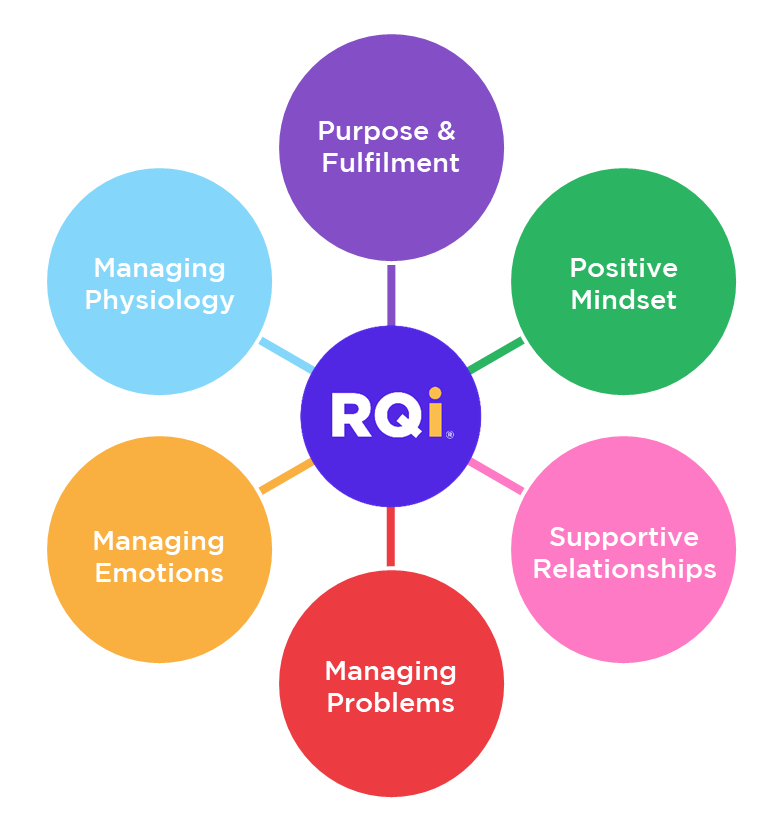Overview
The RQi measures beliefs, behaviours and environmental factors that are proven to protect people against stress and burnout. Users complete an online questionnaire and receive a 26-page report with their scores across seven composite scales and 26 sub-scales compared to a sample population. Users also receive detailed, tailored guidance on how to build even greater resilience.
Six Elements of Resilience
The Six Elements of the RQi are divided into 26 sub-scales, providing the most exact measure of resilience available anywhere in the world. Dr Matthew Critchlow (Kirros Consulting) and Dr Julian Edwards (Open University) designed the tool using a combination of scales developed by them and scales developed by some of the world’s leading experts in health psychology.

How does it work?
The RQi programme has a proven track record in improving your team’s mental health, helping lower stress levels, reducing absence and improving their performance at work.
Each team member completes a secure online questionnaire to produce a 25-page personalised report with scores and recommendations for building resilience.
This is followed by one-to-one coaching to give people the tools and confidence to produce better outcomes at work.
The RQi Team Report has anonymised, collated data for teams and uses different reference populations.
What does our research show?
The RQi is one of the best-studied resilience psychometrics available, using established scales from leading experts with over 20 years of supporting evidence.
Our research shows that when respondents are ranked according to their scores on key RQi sub-scales, people in the top quartile (i.e. the most resilient) v. bottom quartile have:
- 110% Higher subjective wellbeing
- 58% Lower stress scores
- 42% Fewer sick days
- 13% Higher work performance*
Unique benefits of the RQi
The RQi is the only resilience psychometric on the market which contains detailed developmental activities – based on health psychology, positive psychology and behavioural science, with downloadable worksheets and activities for building even greater resilience.
A full range of stress-coping strategies – including Approach and Avoidance Strategies (e.g. denial and distraction) for managing emotions. These include:
- Positive Mindset – including Self-Compassion, measured using a scale developed by Prof Kristen Neff.
- Optimism and Pessimism – measured using a scale developed by Prof Charles Carver
- Lifestyle factors – that are known to affect stress physiology, such as access to daylight and green space
- Detailed development activities – based on health psychology, positive psychology and behavioural science, with downloadable worksheets and activities for building even greater resilience.
Who’s using the RQi?
The RQi™ is used by leading UK employers and key opinion leaders, including the Home Office, the Royal College of Psychiatrists, the Crown Prosecution Service (CPS), and Johnson & Johnson.
Our research
*The data quoted above is an analysis based on a representative sample of working adults in the UK (n = 507) who completed the RQi between Oct-Dec 2015 and compares top quartile v. bottom quartile ranked on 9 RQi sub-scales:
Meaning and Purpose, Perseverance, Work Engagement, General Learning and Growth, Optimism, Self-Confidence, Personal Control and Self-Compassion
